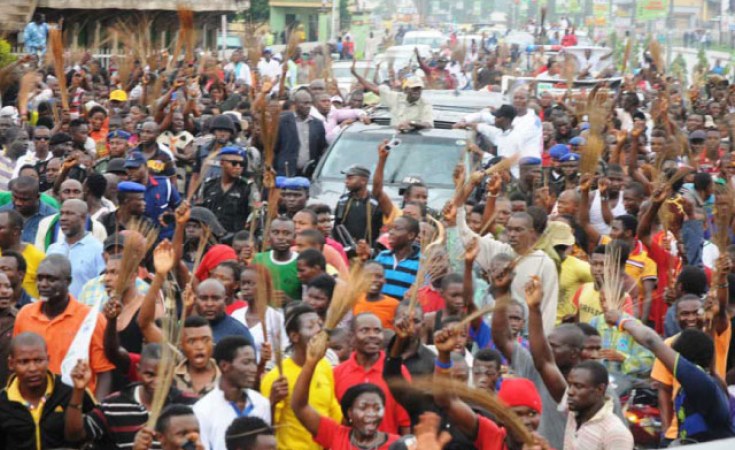The ruling PDP party seem determined to wrest back control of Edo from Governor Oshiomhole.
The stage is set for this Saturday's Edo State gubernatorial elections. While seven political parties have fielded candidates for the election, it looks likely to be a two-horse race between the incumbent Adams Oshiomhole of the Action Congress of Nigeria (ACN) and Charles Airhiavbere of the People's Democratic Party (PDP).
With fears rising that the polling could see electoral malpractice and even violence, it seems the Edo State elections will prove to be another important test of Nigeria's democratic credentials.
Break from the past
Since his assent to the governorship in 2008, Oshiomhole has received numerous plaudits and accolades, with political observers pointing to the improvements in road networks, new schools and health centres. Some say that with Oshiomhole at the helm, the citizens of the Edo State have never had it so good.
This is in contrast to the tenure of PDP's Lucky Igbinedion who governed the state from 1999 to 2007. Igbinedion was accused of misappropriating over N25 billion ($150million) of state funds, and his case is awaiting investigation by the Economic and Financial Crimes Commission (EFCC) and the courts.
Given Oshiomhole's record, the PDP may find it difficult to reclaim the state, but it seems that heavyweights in the PDP are determined to do so.
From labour leader to action governor
Oshiomhole was initially denied his mandate following the 2007 elections, with the Independent National Electoral Commission (INEC) declaring the PDP candidate Osarhiemen Osunbor to be the winner. On November 11, 2008, however, a federal appeal court sitting in Benin City, the state capital, upheld the ruling of the state's elections petitions tribunal which claimed Oshiomhole had in fact won.
Oshiomhole's election signalled a change of guard in a state that was previously a PDP stronghold, and the former president of the Nigerian Labour Congress (NLC) hit the ground running. Oshiomhole has, for example, been credited with raising the state's internally-generated revenue from N250 million ($1.5million) a month to an average of N2 billion ($12.5million) today.
His good works have not gone unnoticed with the World Bank announcing in February their decision to support the Edo State government with the sum of $75 million over the next two years. Under Oshiomhole's stewardship, Edo State was the highest ranked Nigerian state in a recent Information Communications Technology rating conducted by Technology Africa. And the governor has embarked on further groundbreaking initiatives including an ambitious N30 billion ($190 million) storm water project in Benin City which aims to solve the perennial flooding that has bedevilled the town.
The winner takes it all?
Modern day Edo State was created through the splitting of Bendel State by the military regime of Ibrahim Babangida into what are now Edo State and Delta State. Since the return to democracy in 1999, the PDP has largely held sway in both states. Well-known political godfathers have sworn to displace the ACN governor and reclaim the governorship this Saturday by any means necessary.
The main figurehead in this PDP campaign is former minister of works and one-time chairman of the PDP Board of Trustees Anthony Anenih. The self-described Mr Fix-It is a widely recognised force in national politics and the driving force behind Airhiavbere's campaign. The PDP is also utilising its federal might in campaign mobilisation and held a large rally two weeks ago in Edo South Senatorial District. The roll call in this event included Namadi Sambo, Nigeria's vice-president and the chairman of the PDP Campaign Committee for the Edo governorship election, Bamanga Tukur, National Chairman, Samuel Ogbemudia, former chairman and former military governor of Mid-Western State, and Gabriel Igbinedion, Esama of Benin, as well as a plethora of state governors.
What seems certain is that the PDP view Edo as a 'must have' and are leaving as little to chance as possible in their bid to return to power.
Air of uncertainty
It seems that Attahiru Jega, the electoral umpire and chairman of the Independent National Electoral Commission, will have an important and possibly difficult task on his hands this weekend and beyond. Jega has pointed to worrying trends in the run-up to the polls. Speaking during a one-day workshop organised by INEC in Edo State, he said: "What is happening in Edo State is frightening and INEC is worried".
"There is a spectrum of violence and it may affect the lives of the people, especially the youth corps members who will conduct the election. We are really bothered about the security of the electoral process in Edo and protection of lives and property in the state."
To allay fears of violence, the Chief of Army Staff, Lieutenant General Azubuike Ihejirika, ordered the deployment of 3,500 soldiers to the state, though some believe this could be a ploy by the PDP to help rig the poll.
The election will be a test of the Governor Oshiomhole's popularity and achievements thus far, but it is also an opportunity for the PDP to prove it is not a spent force in the state. Ultimately, however, it will be up to Edo State's 1,555,776 registered citizens to stand resolute in deciding their own future by choosing which candidate they want to govern them.
Lagun Akinloye, a British Nigerian, studied Sociology and Social Policy at the University of Leeds. He is particularly interested in the history and politics of West Africa, specifically Nigeria.Email: lagun.akinloye@thinkafricapress.com. Follow him on twitter @L_Akinloye.


